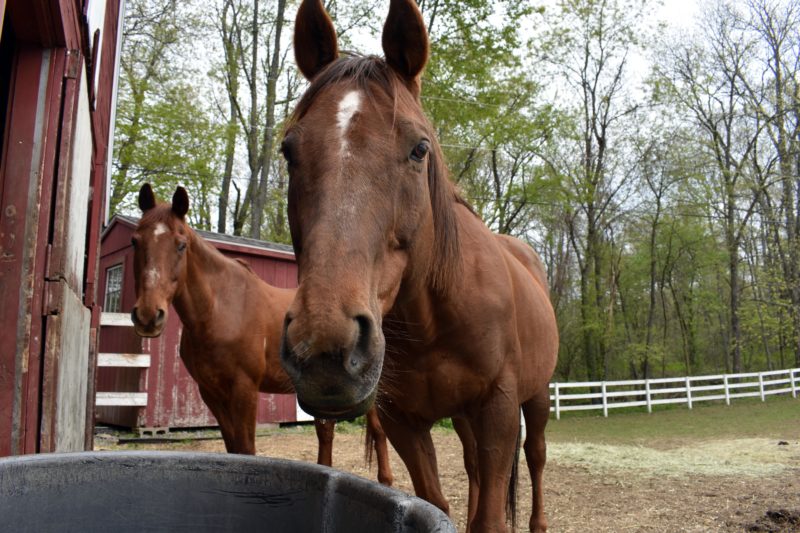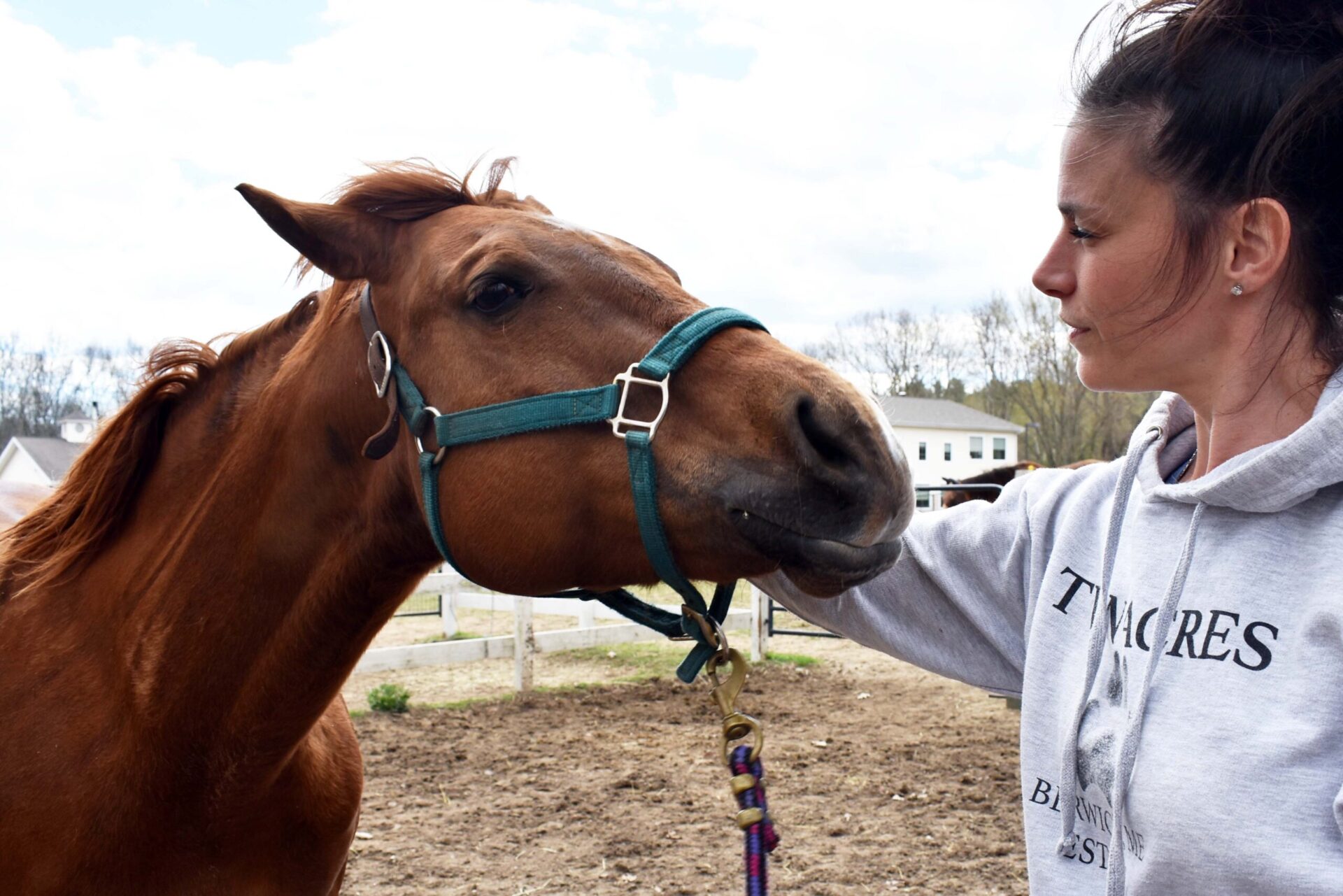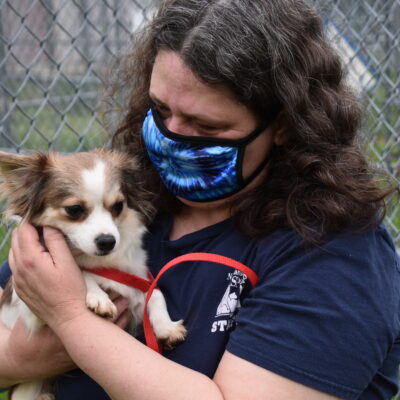
Adopting a horse can be a deeply rewarding experience. When you choose to adopt, you are not only providing a rescued horse with a safe and loving home, you are also freeing up space for another horse in need to enter shelter care. As wonderful as this experience can be, adopting a horse is a tremendous responsibility. Below are some important considerations to review before applying to adopt a horse from the NHSPCA.
General Considerations
- Horses available for adoption through rescue organizations may face a different set of challenges when compared to privately owned horses.
- Many of the horses living at our shelter have been surrendered because they were unwanted, sick or injured or were the victims of cruelty/ neglect.
- Rescued horses may require more experience, patience or expertise than the average privately owned horse.
- Prior to winding up in the care of a rescue organization, many shelter horses may have changed owners or travelled frequently. They need plenty of time (anywhere from weeks to months) to adjust to new homes, new owners and new companions.
- The average life expectancy of a domestic horse is anywhere from 25-28 years old with many horses living well into their thirties. Some miniature horses and ponies may live into their forties.
- Caring for horses requires a considerable time commitment, a certain level of physical fitness and a close working relationship with veterinarians, farriers, trainers and equine-savvy friends/family. Keeping your adopted horse healthy, safe and happy truly does take a village!
Housing
- Horses are herd animals and are accustomed to the company, safety and security of other equines. It is essential that your adopted horse is housed with or in close proximity to other horses.
- Horse owners are required to provide secure, safe shelter for their horses to protect them from the weather. For many horse owners/caretakers, shelter typically takes the form of a barn, stall or run-in shed.
- Horses need plenty of space for exercise, turnout and grazing. Industry standard is approximately 1 acre per horse.
- All outdoor spaces for horses should be secured with horse-appropriate fencing such as electric, wood or metal fence panels.
- Proper manure management is an important part of maintaining a healthy horse. The average 1,000 pound horse can produce up to 50 pounds of waste per day!
- Boarding is an excellent option for owners who are not able to care for their horse at home. It is important to visit a boarding facility prior to arranging care for your adopted horse. Speaking with the barn manager/ owner can help clarify whether a particular barn will be a good match for you and your adopted horse.
Diet
- Horses have very clear dietary needs. The average horse should be fed between 1.5-2 percent of its body weight in roughage per day. Roughage (pasture and hay) should be the foundation of a horse’s diet.
- Grain is often added to a horse’s diet to improve performance, for health reasons or to supplement nutrients a horse may not be getting from hay and pasture alone.
- With grain, less is more. It is important to discuss grain increases or changes with your veterinarian.
- Dietary changes should be made gradually and ideally, over a period of 2 weeks or more to avoid stomach upset or colic.
- Horses thrive on routine. Feeding amounts should be consistent and feeding times should be predictable to avoid stress, stomach upset and behavioral complications
Veterinary Care
- Horses should be seen by a veterinarian at minimum twice a year for a wellness exam, vaccines, bloodwork, parasite management and a dental exam.
- An essential part of maintaining a healthy horse is providing routine dental care. As a horse’s teeth continue to grow upwards from the gums, they require routine “floating” (the process of gently filing away the sharp edges of the teeth) to be able to chew and eat effectively. Dental exams and floating should be performed yearly (or more frequently if needed) by a veterinarian.
- Routine exams and visits from your veterinarian are critical to keeping your horse healthy as he/she ages. Many senior horses will require more thorough veterinary care and may be prone to developing age-related health complications.
Farrier Care
- All horses require regular visits from an experienced farrier (a blacksmith with training and certification to trim and shoe horse hooves).
- The average hoof trimming cycle for most horses is every 6-8 weeks. This may fluctuate according to activity level, season and a variety of other factors.
- Many horses are happy barefoot, but some (and many riding horses) require regular shoeing to do their jobs comfortably.
- Allowing your horse’s hooves to grow too long can cause a host of serious health issues including poor riding performance, lameness, joint and soft tissue damage, injury and much more.
Training/Exercise
- There are many horses who may not require routine training, but there are many horses who do! It is important to be completely honest with yourself about your skill set, experience and comfort level when adopting a new horse. If you are interested in adopting a horse for riding purposes, below are some questions we like to ask during the application process:
- How would you categorize your level of riding experience? Advanced, intermediate, advanced beginner, beginner with little to no experience?
- What kind of riding are you hoping to do with your adopted horse?
- Do you have a trainer you currently work with? Do you take riding lessons?
- Horses used for riding, young horses or horses with behavioral challenges may require training beyond what you can offer as an owner. Professional training with a reputable, humane trainer who has experience with your horse’s personality type and/or discipline is key to success.
- Structured exercise may also be important for your horse’s longterm health and mental stimulation.
- Many horses are happier and healthier when they have a “job” to do.
- In many cases, training and exercise is not only essential for the enjoyment of your adopted horse, but also for your safety in interacting with your horse.
Financial Responsibility
- The single biggest reason for surrendering a horse to the NHSPCA is financial burden.
- Horses are long-lived animals who’s cost of care increases with age.
- The average cost of owning and keeping a horse at home is $250-$300 a month not including veterinary, farrier care, lessons, training or equipment.
- Boarding a horse averages between $400-$800 a month for full- service care, feed and turnout.
- Unexpected veterinary emergencies can result in a hefty vet bill and many horse owners find it helpful to maintain an emergency fund for all their horse’s unforeseen expenses.


